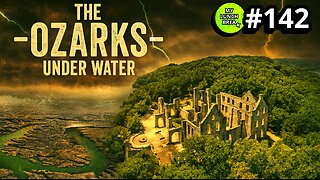Premium Only Content

Is the Bible Truly the Word of God?
The Christian Debate: Is the Bible Truly the Word of God?
Throughout history, the Bible has been regarded as divine scripture by Christians. However, when scrutinized using the same logical and evidential approach that proves the Qur’an’s authenticity, the Bible presents serious challenges that question its divine preservation and authority. This article examines whether the Bible stands up to the test of divine scripture and why the Qur’an emerges as the final, uncorrupted message from God.
---
1. The Preservation Problem: Has the Bible Been Changed?
One of the biggest differences between the Bible and the Qur’an is preservation. If a scripture is from God, we would expect it to be unchanged, as divine words should not be corrupted by human hands.
However, the Bible’s history tells a different story:
No original manuscripts exist – The earliest copies of the New Testament are from hundreds of years after Jesus.
Thousands of conflicting manuscripts – Christian scholars admit that there are over 400,000 variations in biblical manuscripts.
The Council of Nicaea (325 CE) decided what books to include, meaning human intervention played a role in shaping the Bible.
Biblical contradictions exist, which would not happen in a divinely preserved book. For example:
How did Judas die?
Matthew 27:5 – He hanged himself.
Acts 1:18 – He fell headfirst, his body burst open.
Who was Joseph’s father?
Matthew 1:16 – Jacob.
Luke 3:23 – Heli.
In contrast, the Qur’an is perfectly preserved:
✅ The same Qur’an exists today as it did in the 7th century.
✅ Millions of people have memorized it word-for-word.
✅ No contradictions exist in the Qur’an.
✅ The Qur’an itself states, "Indeed, We have sent down the Qur'an, and surely We will protect it." (Qur’an 15:9).
Conclusion: If the Bible has been changed, it cannot be fully divine.
---
2. Does the Bible Contain Divine Scientific Knowledge?
The Qur’an contains scientifically accurate information unknown at the time, such as the expanding universe, the development of embryos, and the preservation of Pharaoh’s body. If the Bible were divine, we would expect the same—or better.
However, the Bible contains scientific errors:
The Earth is flat?
Daniel 4:10-11 describes a tree so tall that "the whole earth could see it"—only possible if the earth were flat.
Revelation 1:7 implies that everyone on earth can see Jesus at once.
The Earth has pillars?
Job 9:6 says the earth is set on pillars, which contradicts modern science.
The Moon gives its own light?
Genesis 1:16 says the moon is a source of light, but we now know it only reflects sunlight.
The Qur’an correctly distinguishes between the sun as a "lamp" and the moon as a "reflected light" (Qur’an 25:61).
Conclusion: If the Bible has scientific errors, it cannot be purely divine.
---
3. Is the Bible Historically Accurate?
The Qur’an revealed historical facts unknown at the time, such as:
The preservation of Pharaoh’s body.
The existence of Haman in Egypt, a name never found in the Bible.
However, the Bible contains historical inaccuracies:
No archaeological evidence of the Exodus at the time it was claimed.
No proof of King David ruling over a great empire, despite the Bible describing a vast kingdom.
The Bible wrongly claims Nebuchadnezzar conquered Egypt (Ezekiel 29:18-20), but history shows this never happened.
Conclusion: A divine book should contain only historical truths, yet the Bible has inaccuracies.
---
4. The Christian Counter-Arguments (and Their Refutations)
Claim #1: “Even if the Bible was altered, its message is still divine.”
✅ Refutation: If a book is divinely protected, it should never be altered. If God allowed His message to be changed once, what stops it from happening again? The Qur’an, unlike the Bible, has never been altered.
Claim #2: “Jesus fulfilled Old Testament prophecies, proving the Bible’s truth.”
✅ Refutation: Many “prophecies” are either misinterpreted or don’t directly mention Jesus. The Old Testament never says the Messiah must be divine, which contradicts Christian beliefs.
Claim #3: “The Bible is about spiritual truth, not science or history.”
✅ Refutation: If a book is from God, it should be free from errors—both spiritually and factually. The Qur’an provides spiritual, scientific, and historical truths without contradictions.
---
Final Conclusion: The Qur’an is the Only Fully Divine Scripture
When tested logically and factually, the Bible fails to meet the standard of an uncorrupted divine revelation. It has been altered, contains scientific errors, and historical mistakes. The Qur’an, in contrast:
✔️ Is perfectly preserved.
✔️ Has no contradictions.
✔️ Contains scientific miracles.
✔️ Reveals historical truths unknown at the time.
Thus, the only logical conclusion is that the Qur’an is the final, unaltered revelation from God, while the Bible, though containing remnants of divine truth, has been altered by human hands over time.
If God truly wanted humanity to have His guidance, wouldn’t He ensure it remains unchanged? That is exactly what the Qur’an has done.
-
 LIVE
LIVE
The Mel K Show
6 hours agoMel K & Corey DeAngelis | The Hopelessly Captured Teacher’s Unions: Biggest Threat to Our Children & Future | 9-6-25
429 watching -
 LIVE
LIVE
SavageJayGatsby
1 day agoSpicy Saturday | Let's Play: Grounded
256 watching -
 3:07:51
3:07:51
Barry Cunningham
5 hours agoPRESIDENT TRUMP ANNOUNCES THE CHIPOCALYPSE! AND I'M HERE FOR IT! (AND MORE NEWS)
108K36 -
 LIVE
LIVE
SpartakusLIVE
3 hours agoVerdansk Duos w/ Nicky || Saturday Spartoons - Variety Later?!
278 watching -
 13:37
13:37
Exploring With Nug
8 hours ago $1.41 earnedTrying to Uncover Secrets in St Augustine’s Waters Missing Person Search!
13K1 -
 LIVE
LIVE
Mally_Mouse
1 day ago🔥🍺Spicy HYDRATE Saturday!🍺🔥-- Let's Play: Grounded
87 watching -
 24:09
24:09
MYLUNCHBREAK CHANNEL PAGE
1 day agoDams Destroyed The Ozarks
60.6K30 -
 1:32:54
1:32:54
Jeff Ahern
6 hours ago $24.39 earnedThe Saturday Show with Jeff Ahern
83.3K9 -
 LIVE
LIVE
TheManaLord Plays
7 hours agoMANA SUMMIT - DAY 1 ($10,200+) | BANNED PLAYER SMASH MELEE INVITATIONAL
204 watching -
 LIVE
LIVE
Major League Fishing
2 days agoLIVE Tackle Warehouse Invitationals Championship, Day 2
116 watching